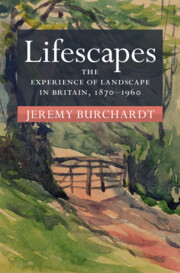‘This is an important - and genuinely affecting - book. By focusing on how landscape was lived, made sense of, and imagined by eight ‘ordinary’ women and men, Burchardt offers a vital rethinking of what landscape means and does in everyday life. The result is a compelling account that artfully demonstrates how, in a period of rapid urbanisation, the countryside and the natural world remained keystones of identity, wellbeing and hope.’
Carl Griffin - author of The Politics of Hunger: Protest, poverty and policy in England, c. 1750-c. 1840
‘Lifescapes explores the profound role of rural landscape in the lives of ordinary people. It offers a ‘deep history of landscape’ - a history attentive less to abstract cultural discourse than personal, affective, real-life experience. Few books have the potential genuinely to be described as field-defining. This is one of them.’
Paul Readman - author of Storied Ground: Landscape and the Shaping of English National Identity
‘Lifescapes offers a deep history of landscape by revealing how people remembered and traced their lives in relation to the landscapes and places in which they lived. Exploring the life-histories of eight diarists living in nineteenth- and early twentieth-century Britain, Burchardt reveals the value and richness of undertaking a biographical approach to landscape history. His work makes a significant contribution to understanding our emotional attachments to landscapes in the past, while raising important questions on how we dwell and find meaning in landscapes today.’
Nicola Whyte - author of Inhabiting the Landscape: Place, Custom and Memory, 1500–1800
‘… a particularly well written, deeply researched and elegantly contemplative work that will surely be of interest to all social and cultural historians of ruralism (and adjacent fields), as well as historians interested in innovative methodologies.’
Daniel Breeze
Source: Cultural and Social History
‘This book was clearly a labour of love, twenty years in the making, and all the better for it as it offers a rich, insightful and affecting analysis. It will make all readers think about their own approach to written sources and what they might tell us about how the land has shaped people’s lives.’
Nicola Verdon
Source: Family & Community History
‘This is a highly thought-provoking book. It challenges us not only to think more acutely about those in the past who lived and worked in the countryside, but also to reflect about our own relationship with the rural landscape.’
Frances Kerner
Source: Open Space Magazine
‘This is a well-researched and detailed book that presents eight detailed life histories which reveal not only aspects of the writers’ engagement with the rural environment, but also many other aspects of their lives.’
Colin G. Pooley
Source: Journal of British Studies



